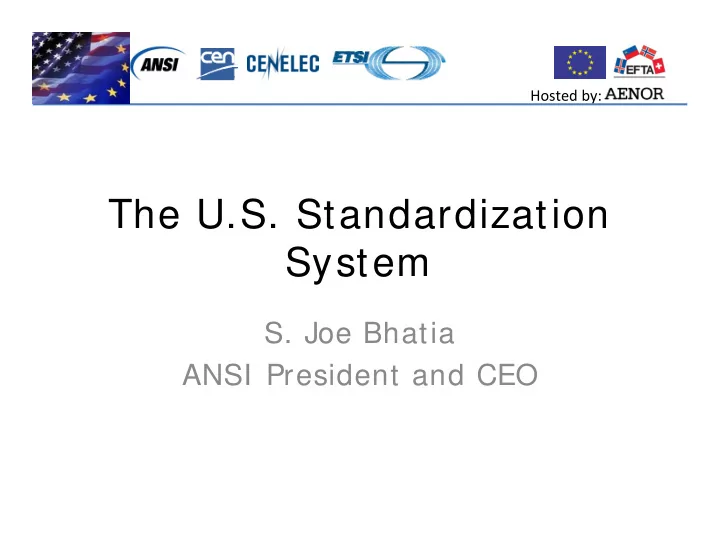

Hosted by: The U.S. Standardization System S. Joe Bhatia ANSI President and CEO
Hosted by: U.S. Standardization System a market driven approach In the U.S. alone, there are more than one hundred thousand standards These documents are being developed by: standards developing organizations (SDOs) over 500 consortia thousands of committees Over 9,500 approved American National Standards
Hosted by: U.S. Standardization System reliable ‐ flexible ‐ responsive Market driven Flexible and sector-based Partnership between public and private sectors This system is designed to . . . Support a broad range of stakeholder engagement Address emerging priorities and new technologies Allow stakeholders to find the solutions that best fit their needs As defined in the United States Standards Strategy www.us ‐ standards ‐ strategy.org
Hosted by: U.S. Standardization System guiding principles Standards should meet societal and market needs and should not be developed to act as barriers to trade The U.S. endorses the globally accepted standardization principles of the World Trade Organization Technical Barriers to Trade Agreement Transparency Coherence Openness Due process Impartiality Technical Assistance Effectiveness and relevance Flexible Consensus Timely Performance-based Balance
Hosted by: The NTTAA U.S. Public ‐ Private Partnership No single government agency has control over standards Each agency determines which standards meet its needs National Technology Transfer and Advancem ent Act ( NTTAA) (Public Law 104-113) Encourages each government agency to seek existing private sector standards that are appropriate for its purpose and mission If none exist, the agency is expected to work with the private sector to develop the needed standards, and to reference them in its regulations
Hosted by: Case Study A National Survey of U.S. Standardization Policies by The Center for Global Standards Analysis Survey: is there a need to change current U.S. standards development policies? ANSI response: the current system is working well Examples cited, U.S. standardization community mobilized Final report presented a virtually unanimous view: Current U.S. standards development policies are working well No changes to the current balance of private-sector/ public sector partnership are necessary at this time http://www.ansi.org/news_publications/other_documents/other_doc.aspx?menuid=7#Policies
Hosted by: Case Study Inquiry from Congressman Gordon Bart Gordon, chair of the U.S. House of Representatives Committee on Science and Technology How important are technical standards? Is a comprehensive review of our standards-setting process timely and worthwhile? Is it time to assess an international standards system developed 50 years ago? Should there be a single federal coordinating point for all technical standards areas? http://www.ansi.org/news_publications/other_documents/other_doc.aspx?menuid=7#Gordon
Hosted by: ANSI Accreditation of Standards Developing Organizations Gary Kushnier ANSI Vice President, International Policy
Hosted by: Accreditation Overview ANSI fosters the U.S. standardization system by accrediting the procedures of standards developing organizations SDOs and subsequently approving individual documents as American National Standards (ANS) More than 2 2 0 accredited SDOs Over 9 ,5 0 0 approved ANS Accreditation is a pre-condition for submission of a candidate ANS to ANSI for approval Learn more: www.ansi.org/ansvalue
Hosted by: What are the advantages of accreditation? Indicates quality, credibility, consensus, and an open standards development process. Increases market efficiency Provides some legal insulation Maximizes market and regulatory acceptance.
Hosted by: What are the essential requirements of accreditation? Due process Openness Balance Consensus Public review Appeals
Hosted by: What is the process for accreditation? ANSI staff review Public review ExSC review Comment resolution ExSC Final approval To maintain accreditation, organizations must continually show compliance with the ANSI Essential Requirements, submit revised procedures to ANSI for approval, and submit to regular audits
Recommend
More recommend